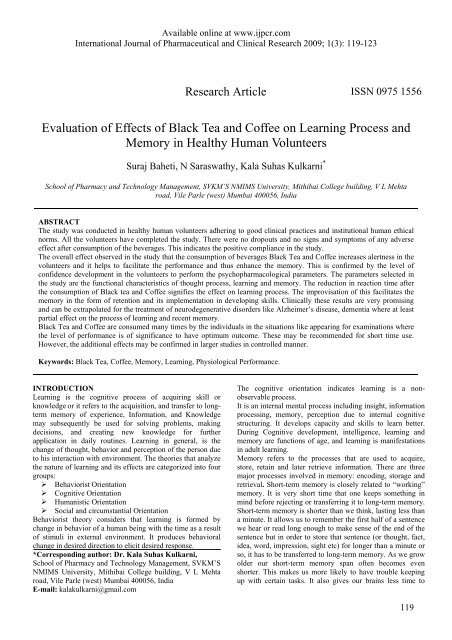Create successful ePaper yourself
Turn your PDF publications into a flip-book with our unique Google optimized e-Paper software.
Available online at www.ijpcr.<strong>com</strong><br />
International Journal of Pharmaceutical and Clinical Research 2009; 1(3): 119-123<br />
Research Article<br />
ISSN 0975 1556<br />
Evaluation of Effects of Black Tea and Coffee on Learning Process and<br />
Memory in Healthy Human Volunteers<br />
Suraj Baheti, N Saraswathy, Kala Suhas Kulkarni *<br />
School of Pharmacy and Technology Management, SVKM’S NMIMS University, Mithibai College building, V L Mehta<br />
road, Vile Parle (west) Mumbai 400056, India<br />
ABSTRACT<br />
The study was conducted in healthy human volunteers adhering to good clinical practices and institutional human ethical<br />
norms. All the volunteers have <strong>com</strong>pleted the study. There were no dropouts and no signs and symptoms of any adverse<br />
effect after consumption of the beverages. This indicates the positive <strong>com</strong>pliance in the study.<br />
The overall effect observed in the study that the consumption of beverages Black Tea and Coffee increases alertness in the<br />
volunteers and it helps to facilitate the performance and thus enhance the memory. This is confirmed by the level of<br />
confidence development in the volunteers to perform the psychopharmacological parameters. The parameters selected in<br />
the study are the functional characteristics of thought process, learning and memory. The reduction in reaction time after<br />
the consumption of Black tea and Coffee signifies the effect on learning process. The improvisation of this facilitates the<br />
memory in the form of retention and its implementation in developing skills. Clinically these results are very promising<br />
and can be extrapolated for the treatment of neurodegenerative disorders like Alzheimer’s disease, dementia where at least<br />
partial effect on the process of learning and recent memory.<br />
Black Tea and Coffee are consumed many times by the individuals in the situations like appearing for examinations where<br />
the level of performance is of significance to have optimum out<strong>com</strong>e. These may be re<strong>com</strong>mended for short time use.<br />
However, the additional effects may be confirmed in larger studies in controlled manner.<br />
Keywords: Black Tea, Coffee, Memory, Learning, Physiological Performance.<br />
INTRODUCTION<br />
Learning is the cognitive process of acquiring skill or<br />
knowledge or it refers to the acquisition, and transfer to longterm<br />
memory of experience, Information, and Knowledge<br />
may subsequently be used for solving problems, making<br />
decisions, and creating new knowledge for further<br />
application in daily routines. Learning in general, is the<br />
change of thought, behavior and perception of the person due<br />
to his interaction with environment. The theories that analyze<br />
the nature of learning and its effects are categorized into four<br />
groups:<br />
� Behaviorist Orientation<br />
� Cognitive Orientation<br />
� Humanistic Orientation<br />
� Social and circumstantial Orientation<br />
Behaviorist theory considers that learning is formed by<br />
change in behavior of a human being with the time as a result<br />
of stimuli in external environment. It produces behavioral<br />
change in desired direction to elicit desired response.<br />
*Corresponding author: Dr. Kala Suhas Kulkarni,<br />
School of Pharmacy and Technology Management, SVKM’S<br />
NMIMS University, Mithibai College building, V L Mehta<br />
road, Vile Parle (west) Mumbai 400056, India<br />
E-mail: kalakulkarni@gmail.<strong>com</strong><br />
The cognitive orientation indicates learning is a nonobservable<br />
process.<br />
It is an internal mental process including insight, information<br />
processing, memory, perception due to internal cognitive<br />
structuring. It develops capacity and skills to learn better.<br />
During Cognitive development, intelligence, learning and<br />
memory are functions of age, and learning is manifestations<br />
in adult learning.<br />
Memory refers to the processes that are used to acquire,<br />
store, retain and later retrieve information. There are three<br />
major processes involved in memory: encoding, storage and<br />
retrieval. Short-term memory is closely related to “working”<br />
memory. It is very short time that one keeps something in<br />
mind before rejecting or transferring it to long-term memory.<br />
Short-term memory is shorter than we think, lasting less than<br />
a minute. It allows us to remember the first half of a sentence<br />
we hear or read long enough to make sense of the end of the<br />
sentence but in order to store that sentence (or thought, fact,<br />
idea, word, impression, sight etc) for longer than a minute or<br />
so, it has to be transferred to long-term memory. As we grow<br />
older our short-term memory span often be<strong>com</strong>es even<br />
shorter. This makes us more likely to have trouble keeping<br />
up with certain tasks. It also gives our brains less time to<br />
119


